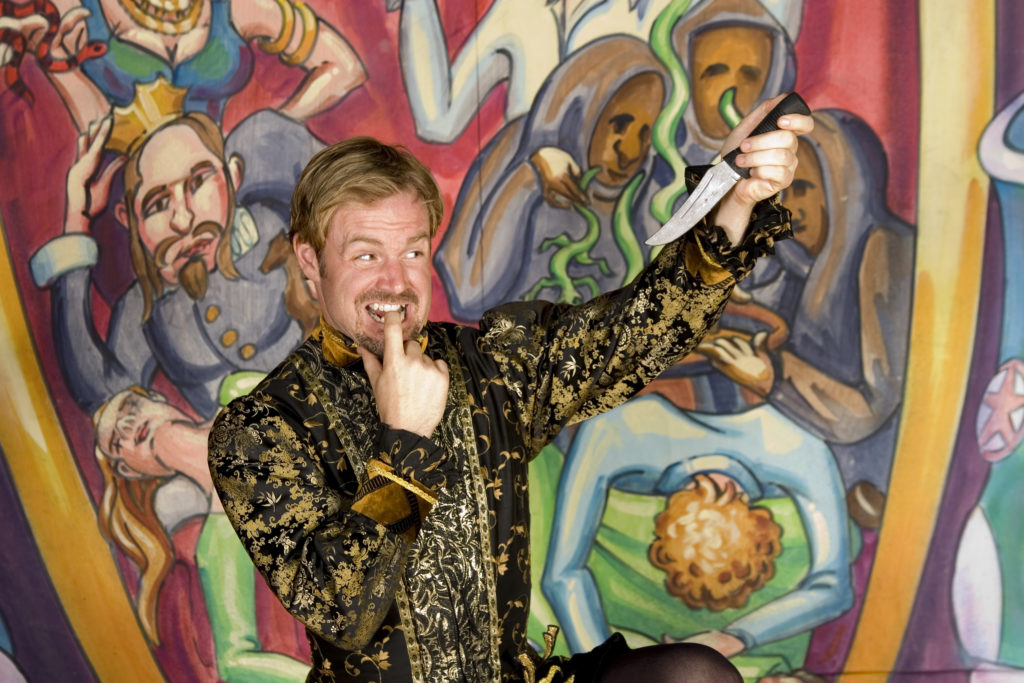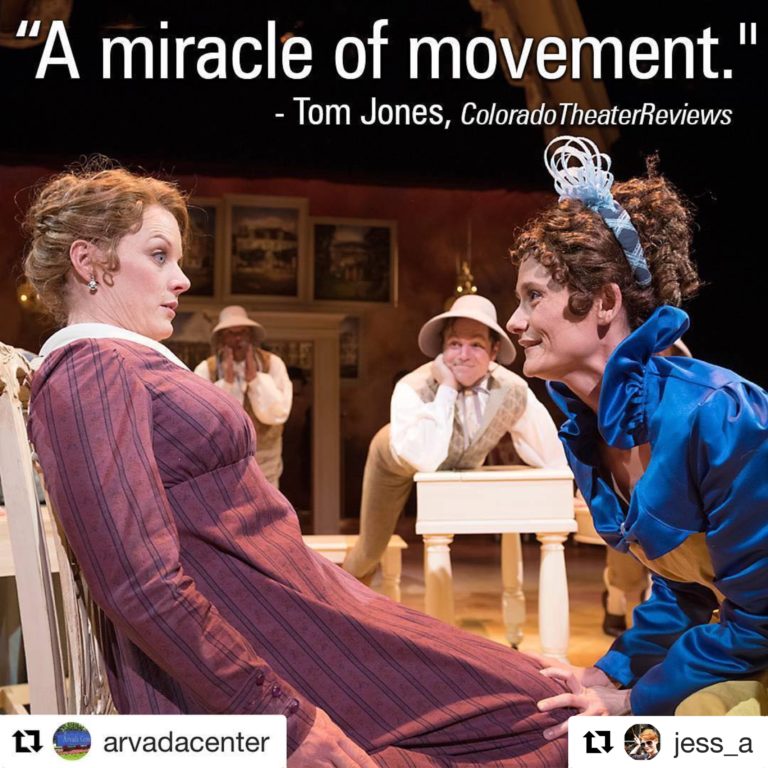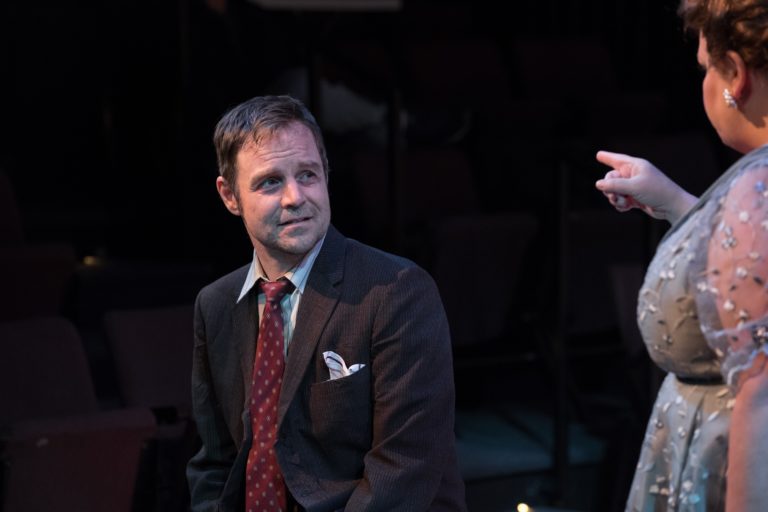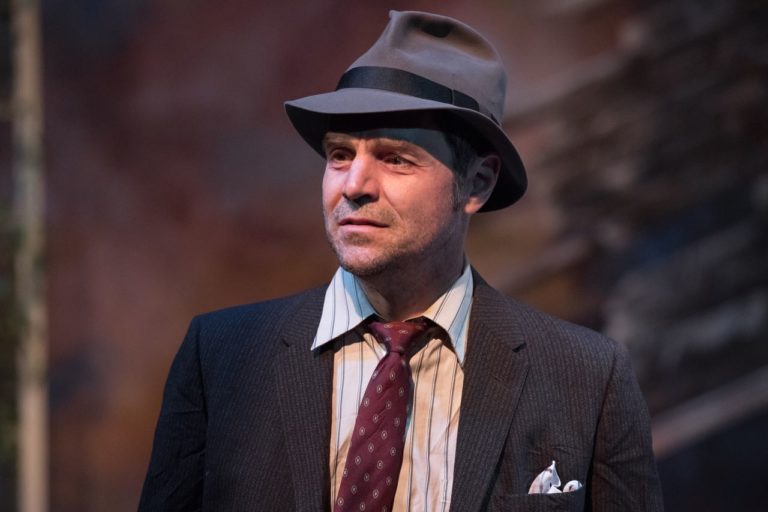
Review: The Complete Works of William Shakespeare (abridged)
These are the complete works of William Shakespeare, but not exactly as he wrote them. The Boulder Ensemble Theatre actors — Geoffrey Kent, Matthew Mueller and Stephen Weitz — spend around ten minutes on Romeo and Juliet, complete with lots of mock fighting and a hilarious rendition of Juliet’s puzzlement as she attempts to commit suicide with a retractable knife; dispense with the history plays in a quick football game utilizing a crown as the football; present a five-minute Macbeth in astounding Scottish accents; make Titus Andronicus into a cooking show; sum up the comedies by twisting all their plots into one insane narrative; and have the audience acting out Ophelia’s id, ego and superego during the nunnery scene in Hamlet.
Given Kent’s expertise in stage fighting and Mueller’s elastic-limbed lightness of foot, you expect sharp, fast physical humor, and you get it. You also get a toy dinosaur that roars, a lot of vomit jokes, a dummy that stands in for various fight opponents and Ophelia’s body, drag jokes, codpiece jokes, breast jokes, men-acting-effeminate jokes, jokes about guys getting kicked in the nuts, and jokes about Mueller throwing tantrums. The parts that had me laughing the loudest occurred when the Ghost of Hamlet’s Father — a puppet — vanished up Shakespeare’s nose, and also when the cast fished a very pretty blond teenager from the front row and asked her to play Ophelia, which she did by looking bemused and, finally, after much help from the actors and Freudian prompting from the audience (see above), emitting an adorable little scream.
The actors add lots of improvised bits to the script — including a reference to Obama and a jibe at Hillary Clinton that I shouldn’t have laughed at (it was sexist) but did — and there are some notable inside jokes, too. About to stab Julius Caesar, the actors stop and say, “We will now pause for fifteen minutes” — a reference to Colorado Shakespeare Festival director Cynthia Croot’s inexplicable decision to schedule the intermission of Julius Caesar at this precise point last summer.
Yes, this is pretty crude stuff. Unlike the work of the Trockaderos, whose sendup of ballet is enhanced by their profound understanding of the form, The Complete Works of William Shakespeare (abridged) isn’t a tribute; it doesn’t try to get inside Shakespeare’s texts. The real joke, the show suggests, is that no one really gets Shakespeare anyway. But then there’s one moment that suggests otherwise: Amid all the craziness, Mueller stops and quietly recites Hamlet‘s “What a piece of work is a man…,” and the poetry and profundity contrast wonderfully with the zaniness of the rest of the action.
I loved Susan Crabtree’s big, bright set, in which Shakespeare looms against the back wall, all twinkly and jovial like the Ghost of Christmas Past, while his characters emerge through the portal of his huge bent legs. All three actors are terrific; they have presence, strong voices, a good sense of humor and the ability to engage directly with the audience. You can tell that each of them would give a good account of himself playing Shakespeare straight. Perhaps the football game could be a bit cleaner. Perhaps the Titus bit doesn’t compare to Buntport’s sublimely inventive spoof of the same play — and it would have been such fun if the chef had been, say, a profane Gordon Ramsey sound-alike rather than just generic and mildly Sweeney Todd-ish.
The Complete Works may be a blunt instrument, void of deeper meaning and kind of dumb, but the energy of the evening is sublime, and I can’t remember when I last laughed so hard and so long.




